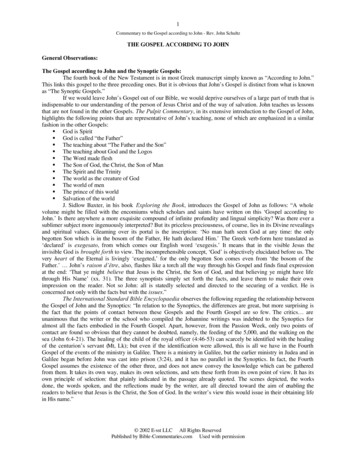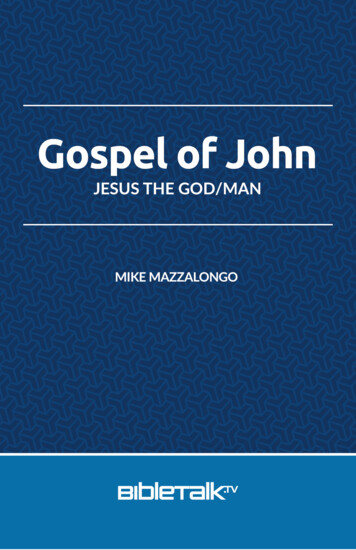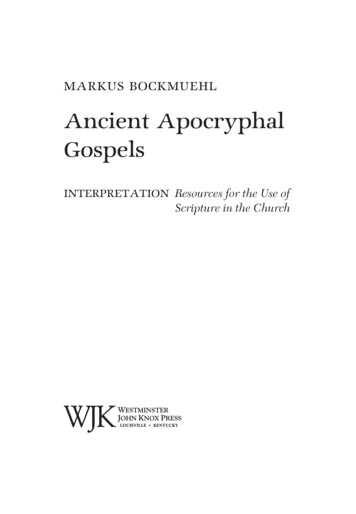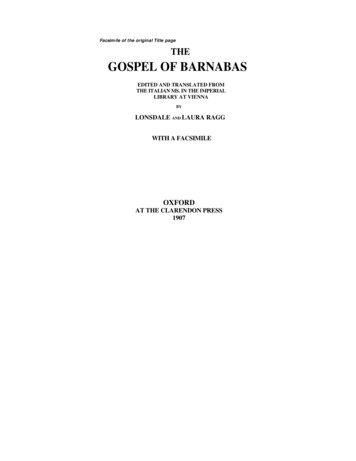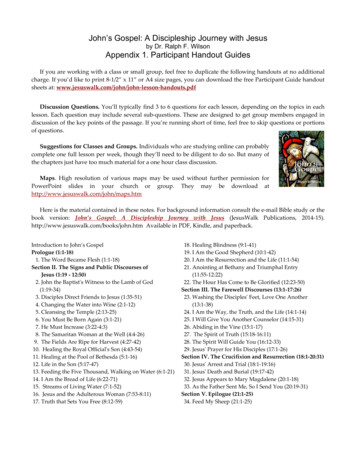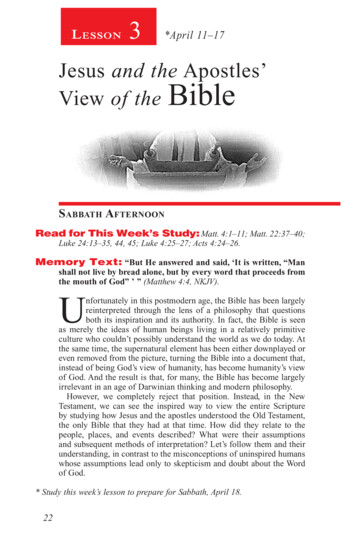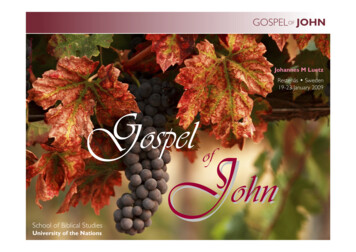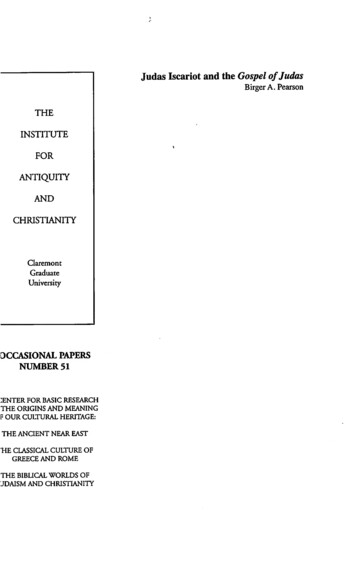
Transcription
Gospel of John: Knowing JesusTABLE OF CONTENTSClick on the study title you’d like to see:INTRODUCTIONStudy 1: JESUS CHRIST IS GODLeader’s Guide — Participant’s GuideStudy 2: YOU MUST BE BORN AGAINLeader’s Guide — Participant’s GuideStudy 3: MIRACLES TESTIFIED OF JESUS’ DEITYLeader’s Guide — Participant’s GuideStudy 4: JESUS AT THE FEAST OF TABERNACLESLeader’s Guide — Participant’s GuideStudy 5: JESUS IS THE GOOD SHEPHERDLeader’s Guide — Participant’s GuideStudy 6: JESUS IS THE MESSIAH AND KINGLeader’s Guide — Participant’s GuideStudy 7: JESUS REASSURES HIS DISCIPLESLeader’s Guide — Participant’s GuideStudy 8: JESUS IS THE VINELeader’s Guide — Participant’s GuideStudy 9: JESUS’ PRAYER, BETRAYAL, ARREST & TRIALLeader’s Guide — Participant’s GuideStudy 10: JESUS’ DEATH AND RESURRECTIONLeader’s Guide — Participant’s Guide
IntroductionSo, what’s the good news about John’s “good news”? The word gospel in Greek, the language ofthe New Testament, means good news. Why did “the disciple that Jesus loved” (21:20, 24) feelcompelled to add another Gospel to the three that had been circulating among the churches forseveral decades? What did he believe he needed to emphasize or add? More importantly, whydid God want another Gospel to be included in the canon of his Holy Scripture? We will beanswering these questions and learning why John’s message was important to his first centuryreaders and to us today.For this study of the Gospel of John, we will engage in inductive Bible study, which means wewill be trying to understand this book by looking at it on three levels. The first level isobservation: What is happening? What is the passage describing? The second level isinterpretation: What is it saying to its first century readers? How would they understand it?And the third level is application: What does it mean to us in the 21st century? How can orshould we apply its eternal truths to our lives?Simply put, (1) you read the chapter, ask the who, what, why, when, and where questions, andtry to understand what is being described; (2) this study will help by providing the meaningwhen it is not obvious or cannot be discerned from the text; and (3) the study will ask youquestions to help you personalize the Scripture and apply it to your life. It would be ideal tomake this a verse by verse study, as every thought and concept is so rich in meaning, but due totime and space constraints, we will highlight what we believe John most wants us tounderstand about his Friend, Teacher, Savior, and Lord. All Scripture references cited are fromthe New International Version unless otherwise indicated.Many of the questions asked do not have “right” or “wrong” answers but are there simply tohelp you think more deeply about and get more out of this account of Jesus’ life, death, andresurrection.While there is some debate, early writers say, and most commentators believe, that the authoris the apostle John, the son of Zebedee, the brother of James, the one to whom Jesus revealedhis betrayer, the one to whom Jesus entrusted his mother at the crucifixion, the disciple whogot to the empty tomb first, and one who saw Jesus appear alive in a locked room after he hadwatched him die. Thus the one writing this book was an eyewitness of Jesus’ life, ministry,death, and resurrection, and could speak with authority.John’s purpose in writing this book is clearly stated in John 20:30–31: “that you may believethat Jesus is the Christ, the Son of God, and that by believing you may have life in his name.”This gospel was probably composed when John was an old man living in Ephesus, around 90A.D., as it came into circulation about that time. Although it was written to an audience of Jewsand Gentiles, the vast majority of the Christian church at the time of John’s writing wereGentiles, coming from a Hellenistic background. By this time, the gospel had spreadthroughout the entire Greco-Roman world. Being written so long after the other three Gospels,John was able to fill in some of the details not recorded by the other writers, give explanationsto the Gentile audience, and address some of the false teaching that had infiltrated the church. 2007 CHRISTIANITY TODAY INTERNATIONALVisit SmallGroups.com and ChristianBibleStudies.com
OVERVIEWIntroductionPage 2So, why should we study the Gospel of John? John was an intimate friend of Jesus, who lovedhim and felt greatly loved in return. John knew through Jesus’ words and “signs” the truth ofhis claim that he was “the way and the truth and the life” (John 14:6). He knew that Jesus hadcome from the Father to offer to one and all abundant life, forgiveness of sin, and eternal life. Itwas John’s hope that in reading his good news, the reader would also embrace these truths andcome to know and love his Lord and Savior, and as a result, become God’s child and have atransformed life.We want to study this book for several reasons, chiefly to have assurance of our own salvationand to be equipped to share our faith with others. We also want to look closely at the person ofJesus, the “Word made flesh” (John 1:14), not only to see what the invisible Father is like (Heb.1:3), but also to see what we as Christians are meant to be like. Jesus is the model for ourrelationship with God, prayer, evangelism, and utilizing the gifts in the power of the HolySpirit. As we begin this study, let’s pray that God will open up John’s message to us, to teach usthe eternal truths contained there, and to reveal to each of us individually what he would haveus apply to our lives to take us to the next level in our relationship with him. 2007 CHRISTIANITY TODAY INTERNATIONALVisit SmallGroups.com and ChristianBibleStudies.com
Gospel of John: Knowing Jesus – Study 1LEADER’S GUIDEJesus Christ Is GodJesus is eternal and one with the Father.In his opening chapter, John records 7 names and titles of Jesus that identifyhim as eternal God. He is the Word, the Light, the Son of God, the Lamb ofGod, the Messiah, the King of Israel, and the Son of Man. In this Gospel, fromstart to finish, John presents evidence that Jesus is the Messiah (Anointed Onein Hebrew; Christ in Greek), the Son of God, so that his readers may believe inJesus as Lord and Savior.Scripture:John 1–2Based on:“Knowing Jesus: A Study of the Gospel of John,” by Patti Evans
LEADER’S GUIDEGospel of John: Knowing Jesus– Study 1Page 2PART 1Identify the IssueNote to leader: At the beginning of the class, provide each person with the “Participant’s Guide”included at the end of this study.John begins his Gospel with the same phrase that begins the Book of Genesis. ReadJohn 1:1–18.Discussion Starters:[Q] Why do you think John begins his Gospel with the same phrase as Genesis 1:1 rather thanwith the birth of Jesus?[Q] Why do you think Jesus is called “the Word” in this passage?Leader’s Note: Webster’s dictionary defines word as “an oral or written sign denotinga thing or an idea; talk; discourse; a message; a promise; information.” We use wordsto convey our thoughts, to express ourselves, to let ourselves be known. Jesus was “theexact representation” of the Father (Hebrews 1:3, John 14:9), and thereby the perfectexpression of God to us. He is God’s message to us. The invisible Father communicates tous what he is like through his Son.[Q] Substitute the name Jesus for “the Word” in John 1:1. How does that make you thinkdifferently about this verse?PART 2Discover the Eternal PrinciplesTeaching point one: Jesus is the eternal God.John declares that Jesus has always been, was with God in the beginning, and was God. Thismay be confusing for us to understand, but the Bible continually teaches that there is only oneGod, made up of three persons: the Trinity, the Tri-unity, the Three in One. Read Genesis 1:26to find this truth “in the beginning.”The word Elohim, God in Hebrew, is a plural noun that takes a singular verb because althoughGod is plural (three persons), he is one God. One way the concept of the Trinity is explained isby looking at the different manifestations of water. For instance, it can be liquid, ice, or steam,but in each case, its essence is water. In the end, all analogies break down, however, becausethe Trinity is unique and beyond our experience.[Q] Explain how the Trinity is revealed in Genesis 1:26.[Q] Looking at John 1:1–18, list the ways that John makes his case that Jesus was and is God.[Q] Many people today believe that we are all God’s children. Is this what the Bible teaches?Look again at John 1:10–13. What do these verses say to this idea? 2007 CHRISTIANITY TODAY INTERNATIONALVisit SmallGroups.com and ChristianBibleStudies.com
LEADER’S GUIDEGospel of John: Knowing Jesus– Study 1Page 3The word believe used in verse 12 is also used 97 other times in the Gospel of John. In thecommon Greek, the original language of the New Testament and the language widely used inthe Greco-Roman world believe means “rely on, trust in, cling to, depend on.” This is the kindof belief that makes one God’s child. It is not just an intellectual assent that he came to earth,lived, died for our sins, and rose again.For example, if I believe it is going to rain, I will take an umbrella or wear a raincoat. In otherwords, it will affect my life. My belief will bear “fruit,” that is, make a difference in my life. Bybelieving in God, I am entrusting my life to him. Many people say they believe Jesus is theirLord and Savior, but whether that belief is making any difference in their lives is a litmus test ofwhat they truly believe.[Q] Which belief is true for you? Are you passively accepting Jesus as your Savior, or are you“relying on, trusting in, depending on, and clinging to” him? Explain.[Q] What do you think the phrase “to all who received him” means?[Q] Do you know for sure that you are God’s child? Why or why not?If you aren’t sure, stay with John. He will explain more about how to become God’s child inchapters 3 and 4.Teaching point two: John the Baptist declared that Jesus is the Lamb of God.Read John 1:19–34.This is the only Gospel where John the Baptist was called John, because the author John neverreferred to himself by name. Therefore there was no need to distinguish between the two.However, for our purposes, to distinguish John the Baptist from the author, we will refer tohim as John the Baptist.John the Baptist was a prophet who called the Jews to repent (to have a change in attitude—toturn away from their sin, their self-will, and turn to God, desiring his will). There had not beena prophet speaking for God for 400 years. Perhaps this was why John had to be so different inorder to get the people’s attention. Four hundred years of silence had allowed the Jews to getvery far from the truths and the ways of the living God.[Q] Why do you think John the Baptist called Jesus the “Lamb of God”?To understand this terminology, we need to understand the Old Testament sacrificial system.From Genesis on, God required the shedding of the blood of an innocent, perfect, spotlessanimal to act as his covering over man’s sins, serving as a temporary means of his grantingforgiveness. This practice pointed to the coming of the Messiah, whose shed blood wouldprovide once and for all forgiveness of sin (Hebrews 9:22).[Q] How did John the Baptist know that Jesus was the Son of God, the long-awaited Messiah?Teaching point three: Jesus gathers his first disciples and begins his publicministry.Read John 1:35–51. 2007 CHRISTIANITY TODAY INTERNATIONALVisit SmallGroups.com and ChristianBibleStudies.com
LEADER’S GUIDEGospel of John: Knowing Jesus– Study 1Page 4In verse 41, we see Andrew going to his brother with the message, “We have found theMessiah,” and then Andrew brought his brother to Jesus. What joyous news this must havebeen to these faithful Jews who had been waiting so long.[Q] Why did the first disciples decide to follow Jesus (vv. 35–37)?[Q] Why did Nathanael decide to follow Jesus (vv. 47–51)?[Q] Why do you think people decide to follow Jesus today?Read John 2:1–11.Mary, the mother of Jesus, Jesus, and two disciples (the author John and his brother James)are attending the wedding in Cana when Mary alerts Jesus that the wine has run out. In thosedays, it was not unusual for a wedding celebration to last a week, and to run out of wine wouldhave been embarrassing for the hosts, the groom, and his family.[Q] Looking at the big picture of John’s purpose—convincing his readers that Jesus is the Sonof God—what in this story supports his premise? (Try to find at least 2 examples.)[Q] Why do you think Mary came to Jesus about the wine running out, since she hadpresumably not seen him do a miracle prior to this time?[Q] What does this story tell you about the kind of person Jesus was?Not only did Jesus respond to the need of the hosts, but he also did far more than Mary couldhave imagined. Each jar held 20–30 gallons, so Jesus provided about 180 gallons of wine. Wesee him here as Jehovah Jireh (God the provider) and El Shaddai (the God who is more thanenough). Remember that Jesus is “the exact representation” of the God of the Old Testament,and reveals to us what the invisible Father is like (Hebrews 1:3).[Q] So, why do you think Jesus did this miracle?Jesus answered his mother’s “prayer” even though it wasn’t part of his immediate plan. Hehears, cares, and responds with compassion to our fervent prayers. “The prayer of a personliving right with God is something powerful to be reckoned with” (James 5:16, The Message).Teaching point four: Jesus begins to show the flaws in the faith of thosearound him.Read John 2:12–25.This story takes place in Jerusalem at the time of the Passover. The men of Israel were requiredto come every year to Jerusalem to celebrate the Passover. They were also required to make asacrifice, and because many came a long distance, vendors worked at the temple to sell theneeded sacrificial animals and doves. We know from the other Gospels that Jesus saw that thevendors were overcharging and that the moneychangers were cheating the people. Also, theyset up in the outer court, the only place the God-fearing Gentiles were allowed to come andworship God. Jesus was furious at the misuse and abuse of God’s temple.[Q] How does this story support John’s view that Jesus is the Messiah? 2007 CHRISTIANITY TODAY INTERNATIONALVisit SmallGroups.com and ChristianBibleStudies.com
LEADER’S GUIDEGospel of John: Knowing Jesus– Study 1Page 5[Q] What does this story tell us about what Jesus values?In this passage, Jesus refers to his body as the temple of God. The Bible teaches us that ourbodies, too, are the temple of God if we belong to Jesus. Today, God resides in his body, thechurch (1 Corinthians 3:16) and in the body of every Christian (1 Corinthians 6:19). What astaggering thought: God no longer lives in a structure, but now resides in us corporately andindividually.PART 3Apply Your FindingsAction Point: The Gospel of John instructs us that a perfect, holy God could not experiencefellowship with sinful, imperfect people any more than dark and light can co-exist. But becauseGod loves each of us so much, he sent Jesus to earth as a solution to our problem. Jesus cameto earth as a man so that he could take our place and die for our sins. Only the one who waspure and had no sin could be the perfect sacrifice to pay for man’s sins. So Jesus took our sinsupon himself on the cross, and died. In fact, he became sin (2 Corinthians 5:21), and like us,became separated from God. He became, as John the Baptist had prophesied, the “Lamb ofGod who takes away the sin of the world” (John 1:29). As with the lambs in Israel’s sacrificialsystem, God’s judgment and punishment of sin was put on Jesus and he died for the sins of theworld. The good news is that he rose from the dead, proving that he had victory over sin anddeath. Jesus is now in a position to forgive our sins and remove the barrier that separates usfrom knowing God, his love, and his plan for our lives.Receiving Christ involves turning from self to God, admitting that you are sinful and fall shortof his standard of perfection (Romans 3:23), and trusting Jesus to come into your heart toforgive your sins and give you eternal life. You can use this prayer or your own words:Lord Jesus, I need you. Thank you for dying on the cross for my sins. I open the doorof my life and receive you as my Savior and Lord. Thank you for forgiving my sins andgiving me eternal life. Take control of the throne of my life. Make me the kind ofperson you want me to be. Amen.If you sincerely prayed this prayer, you can know that Jesus came into your life as he promisedhe would (Revelation 3:20). He also promises that he will never leave you, so you can know thatyou will always have him (Hebrews 13:5). And he promises that whoever has him has eternallife. Therefore, you can know that you will live forever with him, starting right this minute (1John 5:11–13).When you received Jesus by faith, these things happened:1.Christ in the form of the Holy Spirit came into your life (Revelation 3:20 and Colossians1:27).2. Your sins were forgiven (Colossians 1:13–14).3. You became a child of God (John 1:12).4. You received eternal life (John 5:24). 2007 CHRISTIANITY TODAY INTERNATIONALVisit SmallGroups.com and ChristianBibleStudies.com
LEADER’S GUIDEGospel of John: Knowing Jesus– Study 1Page 65.You began the great adventure for which God created you (John 10:10, 2 Corinthians 5:17,and 1 Thessalonians 5:18).1Why don’t you thank Jesus right now for being in your life? Just thanking him demonstratesyour faith. And then go and tell a Christian friend who will rejoice with you. This is the mostwonderful decision you will ever make—to trust your life to the one who created you, knows youbest, and loves you perfectly (1 John 4:18).Study by Patti Evans, with JoHannah Reardon1The prayer and these points are from the “Four Spiritual Laws” by Bill Bright. 2007 CHRISTIANITY TODAY INTERNATIONALVisit SmallGroups.com and ChristianBibleStudies.com
Gospel of John: Knowing Jesus – Study 1PARTICIPANT’S GUIDEJesus Christ Is GodJesus is eternal and one with the Father.In his opening chapter, John records 7 names and titles of Jesus that identifyhim as eternal God. He is the Word, the Light, the Son of God, the Lamb ofGod, the Messiah, the King of Israel, and the Son of Man. In this Gospel, fromstart to finish, John presents evidence that Jesus is the Messiah (Anointed Onein Hebrew; Christ in Greek), the Son of God, so that his readers may believe inJesus as Lord and Savior.Scripture:John 1–2Based on:“Knowing Jesus: A Study of the Gospel of John,” by Patti Evans
PARTICIPANT’S GUIDEGospel of John: Knowing Jesus– Study 1Page 2PART 1Identify the Current IssueJohn begins his Gospel with the same phrase that begins the Book of Genesis. Read John 1:1–18.PART 2Discover the Eternal PrinciplesTeaching point one: Jesus is the eternal God.Teaching point two: John the Baptist declared that Jesus is the Lamb of God.Teaching point three: Jesus gathers his first disciples and begins his publicministry.Teaching point four: Jesus begins to show the flaws in the faith of thosearound him.PART 3Apply Your FindingsAction Point: The Gospel of John instructs us that a perfect, holy God could not experiencefellowship with sinful, imperfect people any more than dark and light can co-exist. But becauseGod loves each of us so much, he sent Jesus to earth as a solution to our problem. Jesus cameto earth as a man so that he could take our place and die for our sins. Only the one who waspure and had no sin could be the perfect sacrifice to pay for man’s sins. So Jesus took our sinsupon himself on the cross, and died. In fact, he became sin (2 Corinthians 5:21), and like us,became separated from God. He became, as John the Baptist had prophesied, the “Lamb ofGod who takes away the sin of the world” (John 1:29). As with the lambs in Israel’s sacrificialsystem, God’s judgment and punishment of sin was put on Jesus and he died for the sins of theworld. The good news is that he rose from the dead, proving that he had victory over sin anddeath. Jesus is now in a position to forgive our sins and remove the barrier that separates usfrom knowing God, his love, and his plan for our lives. 2007 CHRISTIANITY TODAY INTERNATIONALVisit SmallGroups.com and ChristianBibleStudies.com
PARTICIPANT’S GUIDEGospel of John: Knowing Jesus– Study 1Page 3Receiving Christ involves turning from self to God, admitting that you are sinful and fall shortof his standard of perfection (Romans 3:23), and trusting Jesus to come into your heart toforgive your sins and give you eternal life. You can use this prayer or your own words:Lord Jesus, I need you. Thank you for dying on the cross for my sins. I open the doorof my life and receive you as my Savior and Lord. Thank you for forgiving my sins andgiving me eternal life. Take control of the throne of my life. Make me the kind ofperson you want me to be. Amen.If you sincerely prayed this prayer, you can know that Jesus came into your life as he promisedhe would (Revelation 3:20). He also promises that he will never leave you, so you can know thatyou will always have him (Hebrews 13:5). And he promises that whoever has him has eternallife. Therefore, you can know that you will live forever with him, starting right this minute (1John 5:11–13).When you received Jesus by faith, these things happened:1.Christ in the form of the Holy Spirit came into your life (Revelation 3:20 and Colossians1:27).2. Your sins were forgiven (Colossians 1:13–14).3. You became a child of God (John 1:12).4. You received eternal life (John 5:24).5.You began the great adventure for which God created you (John 10:10, 2 Corinthians 5:17,and 1 Thessalonians 5:18).2Why don’t you thank Jesus right now for being in your life? Just thanking him demonstratesyour faith. And then go and tell a Christian friend who will rejoice with you. This is the mostwonderful decision you will ever make—to trust your life to the one who created you, knows youbest, and loves you perfectly (1 John 4:18).Study by Patti Evans, with JoHannah Reardon2The prayer and these points are from the “Four Spiritual Laws” by Bill Bright. 2007 CHRISTIANITY TODAY INTERNATIONALVisit SmallGroups.com and ChristianBibleStudies.com
Gospel of John: Knowing Jesus – Study 2LEADER’S GUIDEYou Must Be Born AgainJesus came to transform us.In chapters 3 and 4, John shows us the transforming power of Jesus’ministry. From the powerful Pharisee Nicodemus, to an insignificantwoman he met at a well, Jesus begins to change lives.Scripture:John 3–4Based on:“Knowing Jesus: A Study of the Gospel of John,” by Patti Evans
LEADER’S GUIDEGospel of John: Knowing Jesus– Study 2Page 2PART 1Identify the Current IssueNote to leader: At the beginning of the class, provide each person with the “Participant’s Guide”included at the end of this study.Read John 3:1–21.Nicodemus was “a member of the Jewish ruling council” and a Pharisee. The Pharisees were agroup of Jews who strictly kept the law of Moses and the “traditions of the elders” (Matthew15:2). These traditions included over 500 manmade interpretations and applications of the lawof Moses regarding daily life, handed down from generation to generation in oral form. Jesuscalled them “rules taught by men,” and said to the Pharisees, “You have let go of the commandsof God and are holding on to the traditions of men” (Mark 7:8).Discussion Starters:[Q] Why do you think Nicodemus came to Jesus at night?[Q] What do you think Jesus meant when he told Nicodemus that in order to see God’skingdom, he must be “born again”?Leader’s Note: Jesus explained to Nicodemus that he must be born of water (physicalbirth) and of the spirit (spiritual birth). God created man to be body, soul, and spirit, butwhen man chose to disobey God, he died spiritually (Genesis 2:17; Romans 6:23). We allare born with a body and a soul (our emotions, intellect, and will) and with a capacityfor spiritual life. In other words, we are two thirds of what God intends us to be. Pascal,the French philosopher and physicist, called the spiritual void a “God-shaped vacuum,which can not be satisfied by any created thing but only by God, the Creator, madeknown through Jesus Christ.” The great philosopher and atheist-turned Christian, St.Augustine, said, “Thou hast made us for Thyself, O God, and our hearts are restless untilthey find their rest in Thee.”[Q] Have you ever felt a void or sense of something missing? If so, how have you tried to fillit? Where do you turn for comfort?PART 2Discover the Eternal PrinciplesTeaching point one: Jesus wasn’t sent into the world to condemn it, but tobring us back into relationship with the Father.Nicodemus was understandably confused by Jesus’ answer, and Jesus was frustrated at howlittle this teacher of Israel understood. Jesus continued to explain to Nicodemus that the onlyway to “enter the kingdom of God” (John 3:5) is to believe in the Son of Man, who must “belifted up” (John 3:14). Read Numbers 21:8–9.[Q] Explain what Jesus meant when he compared his being lifted up to Moses’ lifting up thesnake in the desert. 2007 CHRISTIANITY TODAY INTERNATIONALVisit SmallGroups.com and ChristianBibleStudies.com
LEADER’S GUIDEGospel of John: Knowing Jesus– Study 2Page 3In John 3:16–18 we see how much God loves his creation. Jesus wasn’t sent into the world tocondemn it, but to bring people back into relationship with the Father (John 14:6). However,Jesus explained to Nicodemus that men love darkness instead of truth because their deeds areevil (John 3:19).[Q] Don’t answer aloud, but what have you done in the dark–when no one was looking—thatyou know you would not have done if people could have seen you?[Q] Have you accepted Jesus’ testimony as the truth—that he came from heaven and thatGod was acting through him to save you—or are you still in the dark and under God’swrath (John 3:18)? Explain.[Q] What do you think verse 21 means?Teaching point two: John the Baptist explained to his disciples his role andministry, as well as Jesus’ role and ministry.Read John 3:22–36.John the Baptist said that Jesus is like the groom and that, he, John is kind of like the bestman—he is the friend of the groom. Jesus is the exalted one, but John is content with his placeand is faithful in doing what God has called him to do. John does not fall into the comparisontrap like his own disciples do, who were jealous that Jesus was baptizing more people thanJohn. John knew that Jesus had come from heaven, and that while Jesus must become greater,he must become less. John’s ministry was to prepare the way for Jesus. Once Jesus’ ministryhad begun, John’s job was almost done.[Q] Have you been tempted to compare your situation in life, your ministry or service, or yourspiritual gifts with another Christian’s? If so, how do you not give in to the “comparisontrap” and the resulting jealousy or competition?[Q] Have you learned, like John the Baptist, to be content where you are right now? If so,explain how you have obtained this place of peace.Optional Activity: Do we lose our salvation each time we sin? Give several reasons why orwhy not. Look up these Scriptures in answering this question: John 5:24; Romans 6:23;8:38–39; Ephesians 2:8–9; Colossians 1:13–14; Hebrews 13:5; and 1 John 5:11–13.Teaching point three: Jesus demonstrated radical love to others.Read John 4:1–30.Even though this is early in Jesus’ ministry, the Pharisees were already noticing him and wereconcerned about his increasing popularity. Because of their growing animosity, Jesus decidedto return to Galilee. To get to Galilee from Jerusalem, the shortest route was to go throughSamaria. However, it was unusual for a Jew to go through Samaria because the Jews hated theSamaritans. Jews would go to any length to avoid Samaritans, because they believed contactwith Samaritans would make them unclean. This was a deep-rooted prejudice dating back to772 B.C., when Assyria conquered the northern kingdom of Israel. Many of the Israelites whowere not taken to Assyria married the Gentile Assyrians who were brought into the land to 2007 CHRISTIANITY TODAY INTERNATIONALVisit SmallGroups.com and ChristianBibleStudies.com
LEADER’S GUIDEGospel of John: Knowing Jesus– Study 2Page 4oversee the Israelites left behind. The resulting mixed race were the Samaritans—despised bytheir pureblood Israelite neighbors.[Q] What does it say about Jesus that he, a Jew, went into Samaria? Jesus was a Jew andcame to the Jews, but what does this story show about his heart and mission?Clearly Jesus was not bound or controlled by the culture or the religion of his day. He was ableto distinguish between man’s rules and God’s values. Jesus’ heart, like God’s, is to love. Jesusparticularly had a heart for the oppressed, the poor, the wounded, and the needy.[Q] Verse 27 says that the disciples were surprised to find Jesus talking to a woman. Why doyou think they were surprised?[Q] Give two or three examples of what Jesus did to get this woman’s attention and interest.[Q] Why do you think Jesus said, “Go, call your husband”?Leader’s Note: Jesus had to touch this woman’s conscience to deal with her sin.Remember from our last lesson, that sin separates us from God. Jesus knew she neededto acknowledge the sin in her life before she could turn away from it and embrace thelife he offered her.[Q] Why do you think this woman brings up the issue of the “right” place to worship (v. 20)?Leader’s Note: Perhaps it was a sincere question, as she could see that Jesus was aprophet, or perhaps she was getting uncomfortable with where the conversation wasgoing. At any rate, Jesus answered her question and then got her back on track,explaining to her that it doesn’t matter where one worships, but who one worships; andthat God’s worshipers must worship him in spirit and truth. We saw in chapter 3 thatone can only worship God in spirit if one has received Jesus a
Teaching point two: John the Baptist declared that Jesus is the Lamb of God. Read John 1:19–34. This is the only Gospel where John the Baptist was called John, because the author John ne

